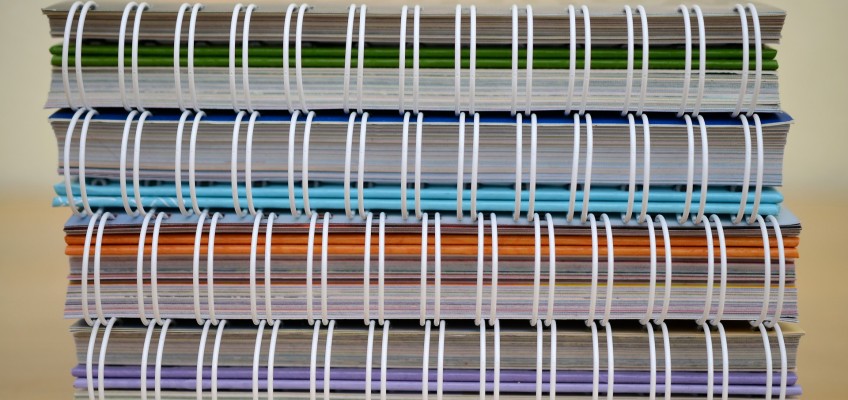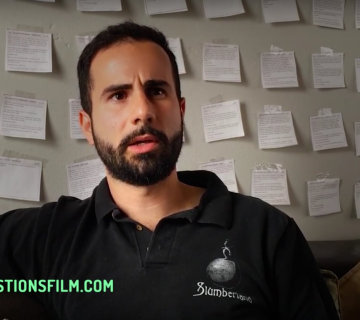When “Script Department” is listed in the credits of a TV show, it is easy to assume they are the writers on the show. However, this is not the case; the writers write, and the script department builds.
On live TV shows, their job is to keep everyone on the same schedule by taking information from all the departments and putting it into documents. It sounds simple, but with so many moving parts and changing schedules and meticulous details, it becomes an enormous job for just a few people. Although every show has it’s own paperwork and specific needs scheduling-wise, lets talk about a typical live TV show. To put things into context, you can imagine a show like The X Factor. Normally the script department is in charge of creating these four documents: the script, rundown, schedule, and grids.
The script is the bible of the TV show; not only does it contain every word that the host of a show will speak, but it also has the timing of when commercial breaks happen, packages (pre-recorded clips with content about the show), intros, songs, exits, and other show elements. Everything is color coded, so when you flip through a script, you know blue pages have commercials, green pages have packages, and white pages have all other words and songs. Once in a while you see even more colored pages like yellow, pink, lavender, salmon, or grey. These pages mean that something has changed whether it was a few words the host says or a swap of contestants in the line-up of the show. Every time something changes, a page is issued and distributed by the script department, which is then collated into everyone’s personal scripts to keep them updated.
The show writers are in charge of delivering the words that the host will say, or anyone else that has scripted copy during the show. Then, the script department is in charge of organizing all of these elements into a script format, and keeping track of changes as well as maintaining everyone’s copies so they are up-to-date, and the show can run smoothly.
The rundown is another important document that has all the information in the script condensed so that it is a quicker read than flipping through a full script. Instead of the host’s words and songs written out, a rundown will have each act broken down into item numbers, with every element listed. It is much more efficient to flip through a rundown and see what song a certain contestant sings and when, than it is to turn every page of a script to find this answer. These are normally distributed on white paper, and then every time it changes, it is issued again on a new color.
The schedule is the master plan of every single day on set. This lays out what time people need to arrive, prep, rehearse, have lunch, and go live for a TV show. This document takes everyone’s schedules and needs from every department and puts it all onto one document harmoniously. Usually a lot of time is spent on this because things always need to be flipped around, pushed later, or changed.
Then there are the grids. These can be any sort of information-heavy document that again makes it easier for people to get information quicker. Some shows will have a document that lists what each contestant will sing and in what order, what presenters are in each act, or whatever the elements of the show are – just so it’s easier for everyone on set to glance down and get an answer.
The script department also maintains the staff list, camera rundowns, quickie rundowns, and quickie grids, which are even more condensed. They also distribute to everyone on set, create binders for people to organize their paperwork, track changes and make sure everyone has them, and then keep on top of timing and other elements during a live show.
To explain what every script department does on every show would be impossible; it always changes to what the crew needs and what the show calls for. This is just an example of one type of show, but for the most part these are the type of documents you will see on a live TV set.
If you’re looking to get into “script”, the job calls for a meticulous mind and attention to detail, an exceptional understanding of Excel and Microsoft Word, and lastly a good attitude. A lot of time is spent conversing with producers, directors, casting, lighting, art, production, stage managers, and all the other departments on set. Overall, the script department will know just about everyone on set; and in my opinion, this is the best part of the job – getting to meet new people and have a laugh with the crew on set every day. Sounds like an excellent place to network, if you’re just starting out in the business, doesn’t it?
The above is a guest blog by Danielle Deffenbaugh. Danielle is an avid filmmaker that re-located to Los Angeles after finishing her degree in Film Production at San Francisco State and is currently happily working in variety TV. Danielle is still exploring a multitude of different jobs in both TV and film productions. Check out her other guest blogs here.





Join the Conversation →